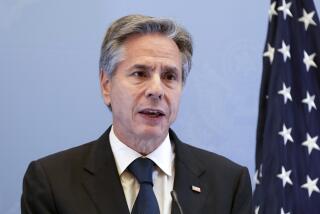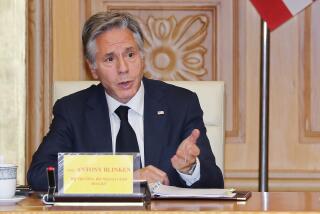Top diplomat says Iran deal possible by Sunday
Envoys from the six global powers that have spent 18 months trying to negotiate a nuclear deal with Iran hope to complete an outline as early as Sunday, two days before the March 31 deadline, according to a top diplomat.
British Foreign Secretary Philip Hammond, speaking to reporters Friday in Washington, said diplomats hope to reach a preliminary deal “over the next 48 hours” but will keep working if they don’t.
Josh Earnest, the White House press secretary, said it was “possible” the negotiators would need until early next week to complete the framework.
Negotiating teams led by Secretary of State John F. Kerry and Iranian Foreign Minister Mohammad Javad Zarif have faced off across a table several times since Thursday morning.
Hammond is expected to arrive Saturday, along with French Foreign Minister Laurent Fabius. The Russian, Chinese and German foreign ministers are expected to fly in Saturday or Sunday.
The group would want to join the final hours of the historic talks, to give their blessing to any final deal and to appear together for an official announcement that could head off a nuclear arms race in the Middle East.
A senior State Department official said Friday that the last two days of talks between Kerry and Zarif “have been tough and very serious.”
“We’re at that point in negotiations where we really need to see decisions being made,” added the official, who declined to be identified under often-invoked State Department ground rules. “We will test whether that is truly possible over the next several days.”
Negotiators from the United States, England, France, Russia, China and Germany are seeking a verifiable accord that would ease international economic sanctions on Iran in exchange for strict limits on its ability to enrich uranium that could be used to fuel a nuclear weapon.
The current round of talks aims to reach an outline by Tuesday, and then fill in the technical details to complete a comprehensive agreement by June 30.
On Thursday, Iranian President Hassan Rouhani sent a letter to President Obama and leaders of the other countries in the negotiating group, and spoke by phone with the leaders of Britain, Russia and France.
U.S. and Iranian officials have spoken optimistically of their progress, yet also acknowledged that major differences remain. They continue to caution that a deal is still not certain.
Kerry told reporters Friday afternoon that the group was “working hard – not there yet.”
“There are many disagreements,” Iranian Deputy Foreign Minister Abbas Araqchi told Iran’s Press TV. “We are trying to bridge the gaps.”
Officials said the central focus remains two issues that have been under discussion for several weeks: how quickly to lift United Nations sanctions on Iran, and future constraints on Iran’s nuclear research and development.
Iran wants U.N. sanctions lifted at the start of any deal while the U.S. and and the other five nations insist on a step-by-step process based on Iran’s compliance with the terms of the expected 10-year accord. It’s unclear if that dispute, a potential deal breaker, has been fully resolved.
The six powers also want to restrict Iran’s nuclear research and development abilities to ensure Tehran can’t build technology that could enable it to quickly build a bomb. Iran denies it seeks to build nuclear weapons.
In Tehran, at traditional Friday prayers, Imam Kazem Sadigihi echoed Iranian officials’ demands in the talks. Sanctions, he said, must be lifted “in one go.”
But Earnest, the White House press secretary, said Obama still envisions a “phased waiving of the sanctions.”
The administration would have to see a “sustained, long-range compliance with the agreement before we start have a conversations about removing things like the [U.S.] statutory requirements.”
The two sides also remain at odds over what form their outline will take.
U.S. officials say they want to provide details to the public to allow them to judge the merits of the preliminary deal.
Iranian officials are wary of disclosing too much until all the details are negotiated. They have been reluctant to put what they call a “political understanding” in a written document.
More to Read
Start your day right
Sign up for Essential California for news, features and recommendations from the L.A. Times and beyond in your inbox six days a week.
You may occasionally receive promotional content from the Los Angeles Times.







